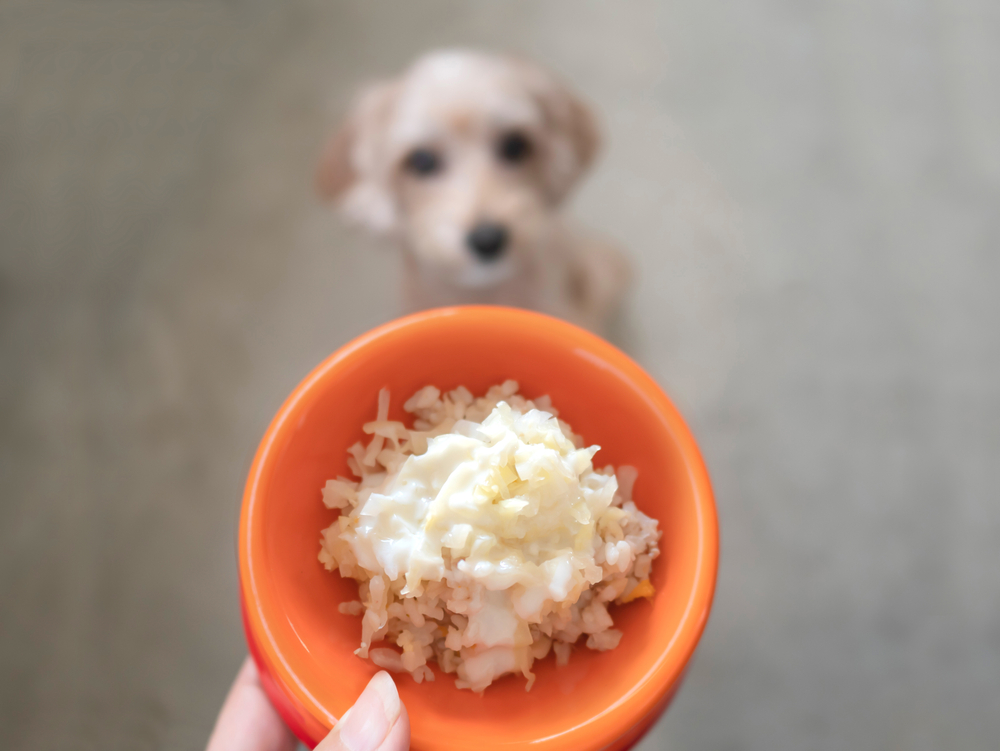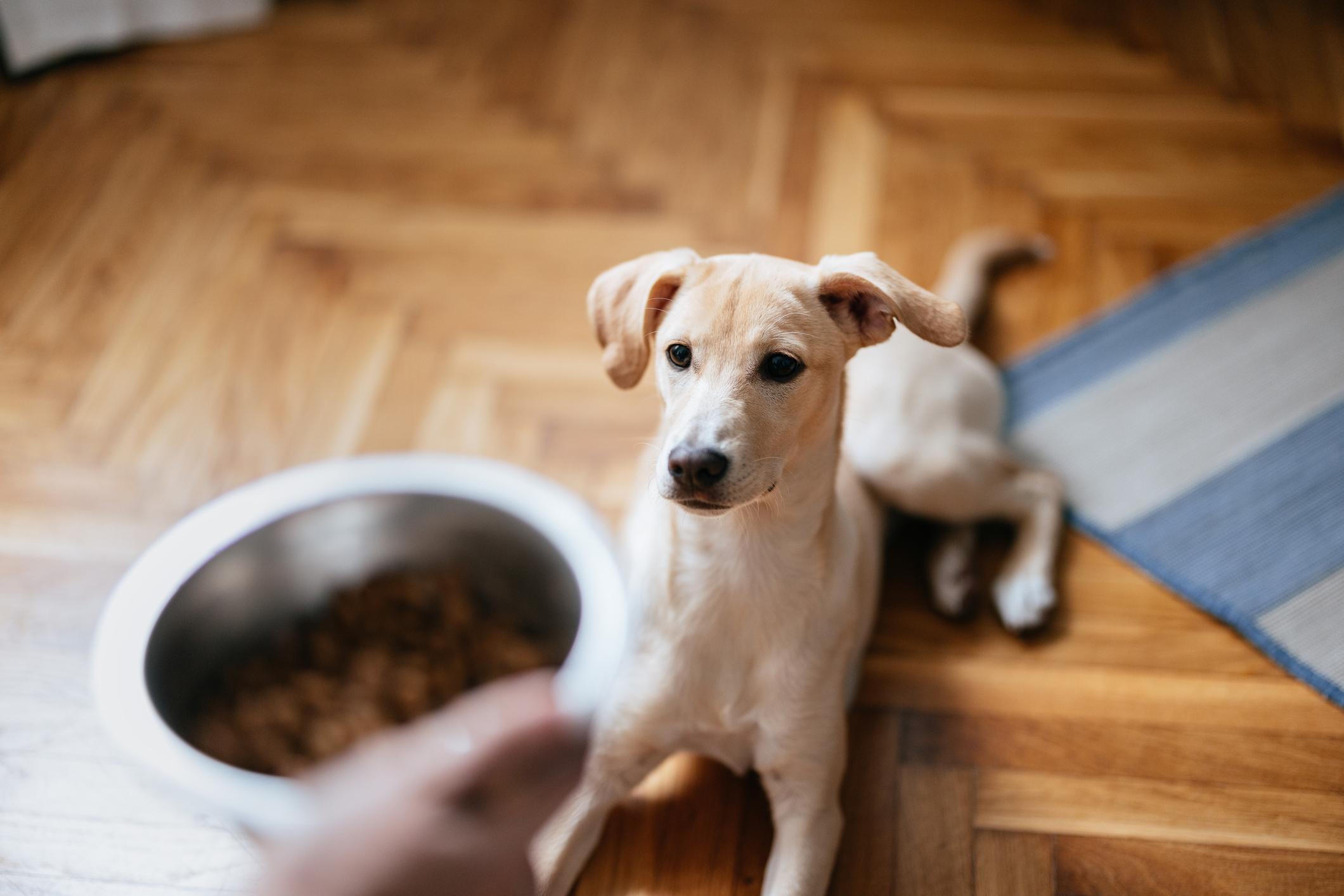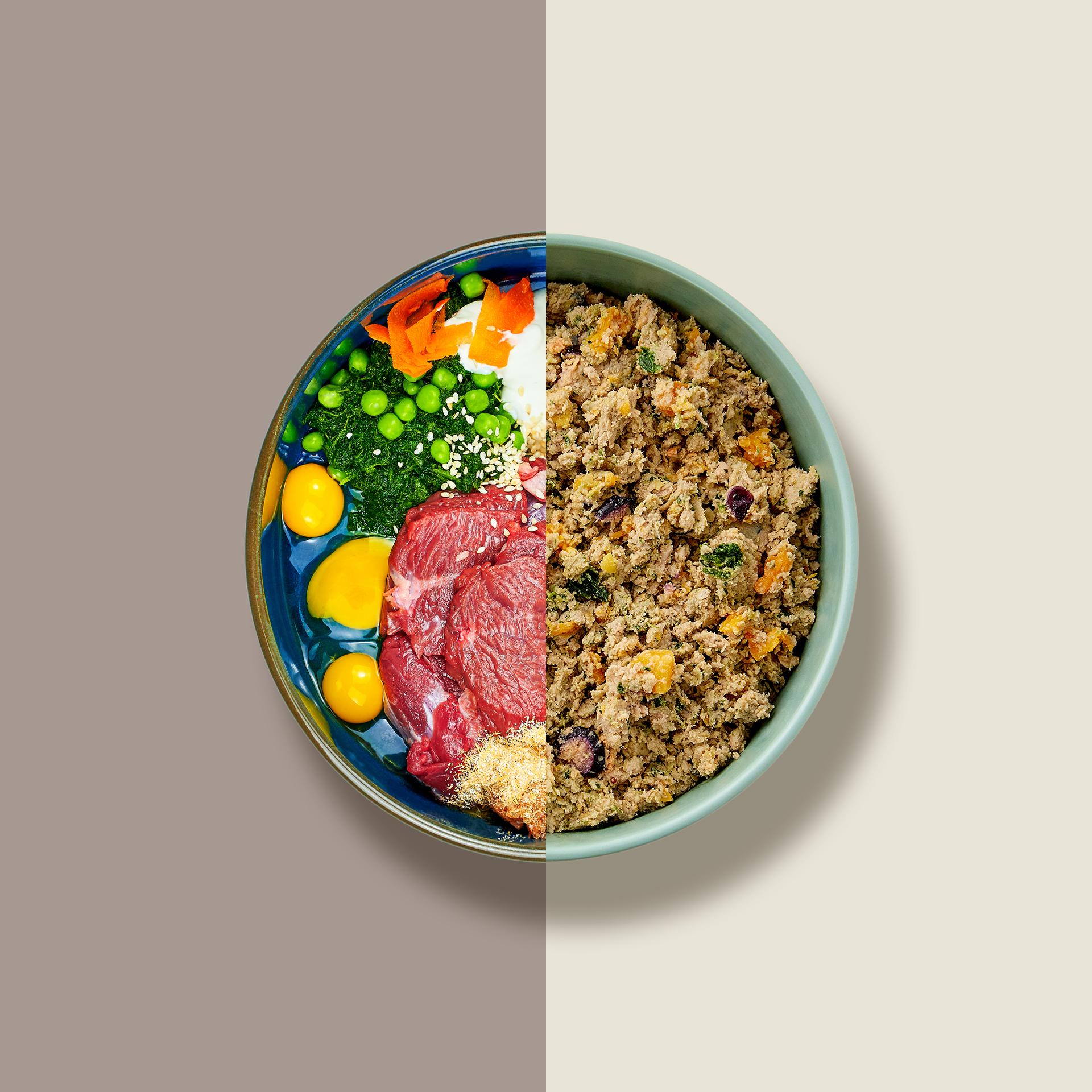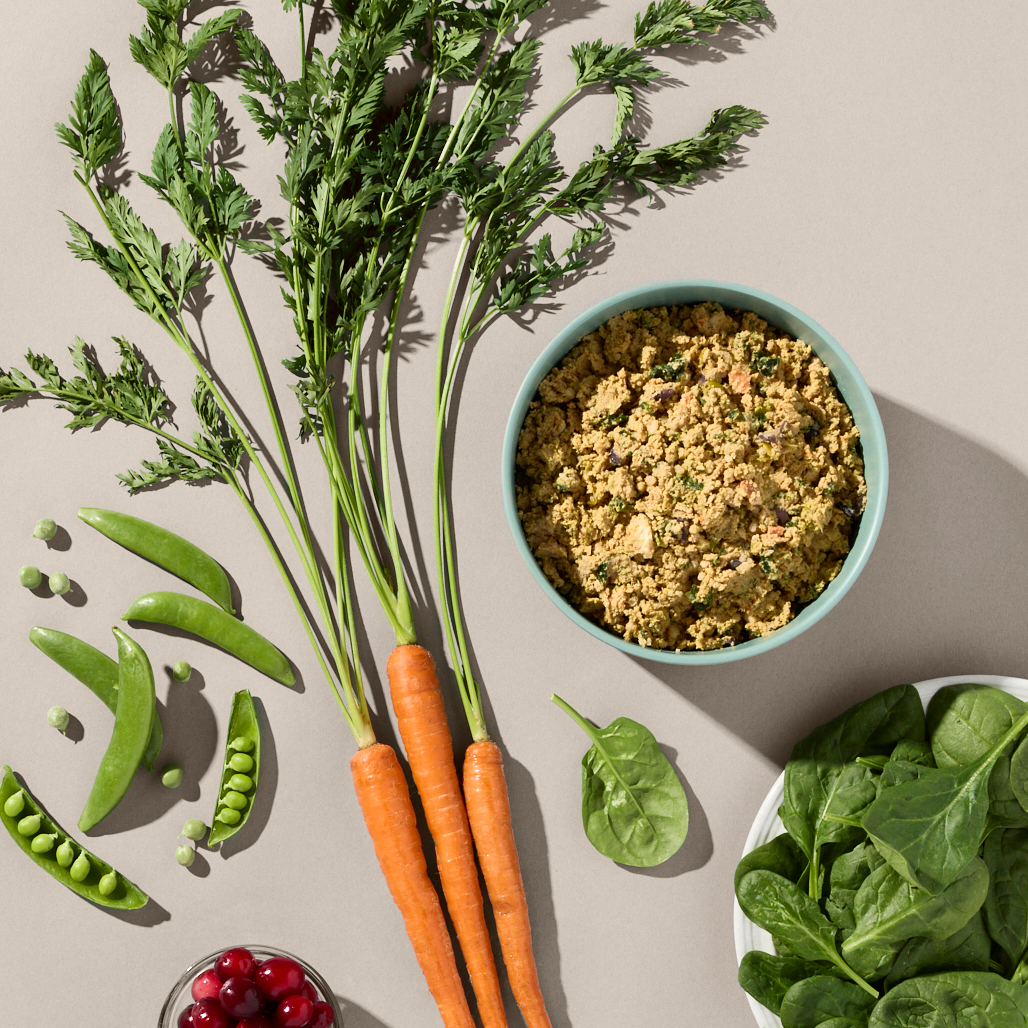Hey Ollie blog readers! We’re offering you an exclusive 60% OFF your starter box! Try now!
Rice is a staple food for more than half of the world’s population. It’s inexpensive, stores well, and is easy to make. The good news is that dogs can eat rice, too! In fact, rice is a great source of highly digestible carbohydrates for dogs and is tolerated well by almost all pups. Learn what kind of rice is best for your dog to eat and how to prepare rice so that your dog can maximize the health benefits of this popular grain.
Can Dogs Eat Rice
Yes, dogs can eat rice! It’s a common ingredient in many commercial dog foods and is often used as a home remedy for digestive issues. White rice, in particular, is easy to digest and provides a quick source of energy, making it a go-to option for dogs recovering from an upset stomach. Many veterinarians recommend feeding plain white rice when a dog has diarrhea or other stomach troubles because it’s low in fiber and gentle on the digestive system.
Brown rice is another option, offering more fiber and nutrients than white rice. Because brown rice retains its outer bran layer, it contains more vitamins, minerals, and antioxidants. However, this extra fiber can make it harder to digest, especially for dogs with sensitive stomachs. If your dog has gastrointestinal issues or needs a bland diet, white rice is usually the better choice.
Although rice is safe for dogs, it should be served in moderation. Too much rice can lead to an unbalanced diet, as it is high in carbohydrates but low in protein and other essential nutrients. Over time, excessive carbs can contribute to weight gain, especially in less active dogs. For dogs with diabetes, white rice can cause a spike in blood sugar, so it’s best to consult your vet before adding it to their diet regularly.
When preparing rice for your dog, always serve it plain. Avoid adding butter, oil, salt, or seasonings, as ingredients like garlic and onion can be toxic to dogs. Stick to simple, cooked rice and serve it as an occasional treat, a supplement to their regular meals, or as part of a vet-approved diet plan.
The good news is that dogs can eat rice, too! In fact, rice is a great source of highly digestible carbohydrates for dogs and is tolerated well by almost all pups. Learn what kind of rice is best for your dog to eat and how to prepare rice so that your dog can maximize the health benefits of this popular grain.
Health Benefits of Rice for Dogs
Rice is rich in carbohydrates, but it contains protein and fiber as well. In Natural Dog Care, Bruce Fogel, DVM, MRCVS, explains, “Energy comes from the protein, fat, and carbohydrates eaten by your dog. Carbohydrates are converted to sugar and provide instant energy.”
Rice is also a great source of vitamin D, fiber, and iron for your dog. Vitamin D helps regulate calcium and phosphorous levels, while iron aids in the formation of hemoglobin, the molecule in red blood cells that carries oxygen.
Rice is a great choice for dogs who have an immune response to gluten, according to Brittany Kuenster, a licensed veterinary technician with Pet Vets in Oak Park, Illinois. Because rice delivers important carbohydrates without gluten, it’s perfect for gluten-sensitive dogs.
These nutritional benefits are why Ollie uses rice in some of its recipes. In the Chicken Goodness recipe, rice is mixed with chicken, chicken gizzard, carrot, green peas, and more to create a balanced meal that meets the nutritional levels established by the AAFCO Dog Food Nutrient Profiles for All Life Stages.
Here are some key benefits of rice for dogs:
- Energy Boost – Rice is a great source of carbohydrates, providing quick energy for active dogs.
- Digestive Support – White rice is easy to digest and can help soothe an upset stomach.
- Rich in Essential Nutrients – Rice contains:
- Vitamin D – Helps regulate calcium and phosphorus levels, supporting bone health.
- Iron – Aids in the formation of hemoglobin, which carries oxygen in the blood.
- Fiber – Supports healthy digestion and regular bowel movements.
- Gluten-Free Option – Rice is safe for dogs with gluten sensitivities, making it a great alternative to grains like wheat.
Can Dogs Eat White Rice?
Yes! White rice—rice that has had the husk, bran, and germ removed—is a healthy part of a balanced diet for dogs. The absence of the husk makes white rice lower in fiber and slightly higher in calories and carbohydrates than brown rice. It’s easy on dogs’ digestive systems, making it a good choice for dogs experiencing GI distress or who have a sensitive stomachs.
Plain white rice mixed with chicken is sometimes recommended by vets for dogs experiencing diarrhea. The fiber and starch in white rice help bind the stool and calm the gut.
Can Dogs Eat Brown Rice?
Less processed than white rice, brown rice retains the husk, bran, and germ. It is slightly lower in protein and carbohydrates but higher in fiber than white rice. Brown rice carries the same nutritional benefits for dogs as white rice and is actually higher in antioxidants.
However, due to its coarser texture, some dogs have difficulty eating brown rice. White rice is also a better option for any dog experiencing GI distress.
How to Cook Rice for Your Dog
When it comes to cooking rice for your dog, plain is the name of the game. Don’t add any salt or pepper, and be careful not to mix in onions or garlic, which can be harmful or even toxic for dogs. Make sure to cook the rice according to the package directions until it’s mushy to avoid any digestive issues associated with uncooked rice. Because it’s high in calories, the rice shouldn’t make up more than 10 percent of your dog’s diet.
How To Safely Serve Rice To Your Dog
When feeding rice to your dog, preparation and portion control are key. Rice should always be plain, fully cooked, and unseasoned to ensure it’s safe and easy to digest. Here’s how to properly serve rice to your pup:
- Cook it thoroughly – Boil white or brown rice in water without adding salt, butter, oil, or seasonings.
- Keep portions small – Rice should only be a supplement to your dog’s diet, not the main course. A good rule of thumb is to make sure rice makes up no more than 10% of their daily food intake.
- Mix it with their regular food – To add extra nutrition, mix cooked rice with your dog’s regular meals or pair it with lean proteins like chicken or turkey.
- Avoid raw or undercooked rice – Uncooked rice can be difficult to digest and may cause stomach discomfort.
While rice is safe for most dogs, always introduce new foods gradually and monitor for any digestive issues like bloating or loose stools. If you’re unsure about serving rice to your dog, consult your veterinarian for guidance.
Common Reasons a Pet Parent Might Give Rice to Their Dog </H@>
Rice isn’t just a convenient food option—it can serve various purposes in your dog’s diet. Some of the most common reasons pet parents feed their dogs rice include:
- Digestive Upset – White rice is often recommended for dogs experiencing diarrhea or mild stomach issues.
- Food Sensitivities – Since rice is gluten-free, it can be a great alternative for dogs with grain allergies.
- Weight Management – When served in moderation, rice can provide a low-fat energy source for dogs who need a gentle diet.
- Homemade Meals – Some pet parents include rice in home-cooked meals to add variety and balance to their dog’s nutrition.
- Senior Dog Diets – Older dogs may benefit from rice as it’s easy to chew, digest, and provides a simple carbohydrate source for energy.
While rice can be beneficial, it’s always important to ensure your dog gets a balanced diet with protein, healthy fats, and other essential nutrients.
Rice for a Sick Dog
If your dog is feeling under the weather, rice can be a gentle, soothing food that helps with digestion and recovery. Many veterinarians recommend a bland diet of plain white rice and boiled chicken when a dog is experiencing:
- Diarrhea – White rice helps firm up stools and replaces lost energy.
- Vomiting – A small serving of rice can be easier on the stomach than rich or fatty foods.
- Loss of Appetite – Rice is mild in flavor and may encourage a sick dog to eat.
To prepare a simple recovery meal, cook plain white rice and mix it with an equal amount of boiled, skinless chicken. Start with small portions and gradually transition back to their regular food as their stomach settles.
If symptoms persist for more than 24-48 hours, or if your dog shows signs of dehydration, lethargy, or severe discomfort, contact your vet immediately.
Tagged As:

The nutrition your dog needs,
the food they want.

Enjoying our articles? Subscribe our Newsletters and get new articles directly to your inbox
You might also like
12 August 2025
5 MINS READ
Top 8 Allergens Hiding in Your Dog’s Bowl
As pup parents, we never want to see our dogs uncomfortable. When it comes to itching, swelling, and upset stomachs, the culprit may be in their bowl. Understanding the most common allergens and t…
by Ollie Pets
12 August 2025
5 MINS READ
Raw vs. Gently Cooked: Which Is Ideal for Your Pup?
As more pup parents seek the best fresh dog food for their companions, they may find themselves choosing between a raw diet and a fresh diet. While cases have been made for both options, let’s exa…
by Ollie Pets
12 August 2025
5 MINS READ
Why Human-Grade Ingredients Matter for Your Dog
A healthier, happier dog starts with the right food. That said, knowing which diet is best for your pup can be overwhelming at times. Understanding what human-grade means, why it matters, and how …
by Ollie Pets







